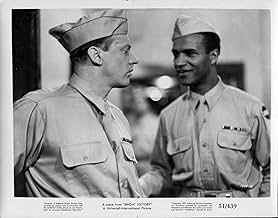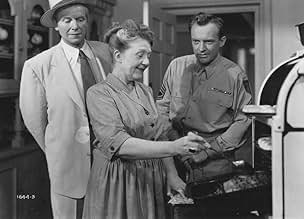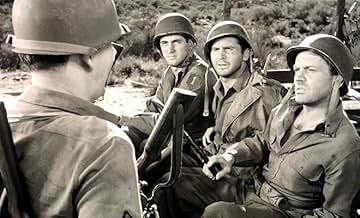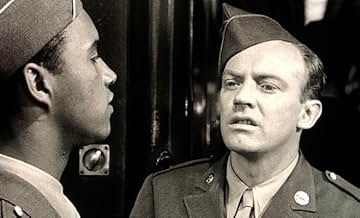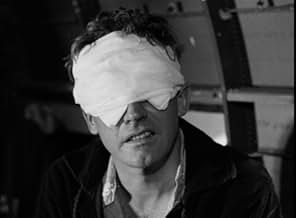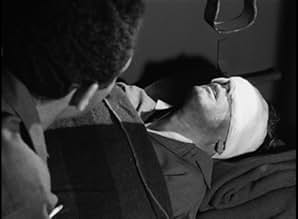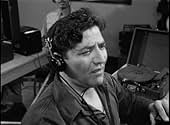CALIFICACIÓN DE IMDb
7.3/10
1.1 k
TU CALIFICACIÓN
Agrega una trama en tu idiomaAfter he gets blinded by a German sniper's bullet in 1943, Sergeant Larry Nevins begins the long and painful road to recovery.After he gets blinded by a German sniper's bullet in 1943, Sergeant Larry Nevins begins the long and painful road to recovery.After he gets blinded by a German sniper's bullet in 1943, Sergeant Larry Nevins begins the long and painful road to recovery.
- Dirección
- Guionistas
- Elenco
- Nominado a 2 premios Óscar
- 5 premios ganados y 6 nominaciones en total
Julie Adams
- Chris Paterson
- (as Julia Adams)
- Dirección
- Guionistas
- Todo el elenco y el equipo
- Producción, taquilla y más en IMDbPro
Opiniones destacadas
What is really interesting about this movie, is the "race" issues it addresses and for the time in which it was made, that is rather remarkable.
The Nevins character is a good old boy from the South and openly expresses his racism. The first time is when he's on the plane headed back to the states and a black soldier sits next to to him. They're both from Florida start talking. Nevins asks him if he knows the country club and the guys says he served tables at it. Nevins now realizes the guy is black and immediately calls over a nurse to sit by him.
The next time is in the rehabilitation hospital. Nevins accidentally walks into a black soldier, also blind. All Nevins recognizes is the man's southern accent and offers to buy him a drink. They become "friends" and hang out together. Then one day, the other blind soldiers mention there are some new patients coming into their ward and Nevins pops off, "Yeah, and I heard 3 of them are (uses the "N" word)". The black guys just stops in his tracks now realizing how his new friend really thinks and feels.
The other blind white soldiers already knew the guy was black and remarked "Maybe he thought you were colored too".
Later on Nevins goes home and is with his parents, who are equally racist. Nevins starts to "see" the errors of his ways/thinking. There is a bit of justification from the father that that was how they were brought up, etc., but for 1951 it is amazing they were even addressing such things let alone using the "N" word.
The Nevins character is a good old boy from the South and openly expresses his racism. The first time is when he's on the plane headed back to the states and a black soldier sits next to to him. They're both from Florida start talking. Nevins asks him if he knows the country club and the guys says he served tables at it. Nevins now realizes the guy is black and immediately calls over a nurse to sit by him.
The next time is in the rehabilitation hospital. Nevins accidentally walks into a black soldier, also blind. All Nevins recognizes is the man's southern accent and offers to buy him a drink. They become "friends" and hang out together. Then one day, the other blind soldiers mention there are some new patients coming into their ward and Nevins pops off, "Yeah, and I heard 3 of them are (uses the "N" word)". The black guys just stops in his tracks now realizing how his new friend really thinks and feels.
The other blind white soldiers already knew the guy was black and remarked "Maybe he thought you were colored too".
Later on Nevins goes home and is with his parents, who are equally racist. Nevins starts to "see" the errors of his ways/thinking. There is a bit of justification from the father that that was how they were brought up, etc., but for 1951 it is amazing they were even addressing such things let alone using the "N" word.
"Bright Victory" came as a total surprise. The film is not seen as much as it should, because of its positive message. Mark Robson directed with an eye to detail. "Bright Victory" was adapted by Robert Bruckner and has a pleasant music score by Frank Skinner.
In spite of taking place during WWII, the movie seems timeless right now because of the Iraqi conflict. We are shown an Army hospital where the young soldiers are seen rehabilitating and learning new skills for their permanent disabilities. The wounded men we see in the Army facility at Valley Forge, Pa., are being treated because of their blindness as a result of wounds received in combat.
For a 1951 film, "Bright Victory", was light years ahead since the young G.I.s we see in the hospital have to come to terms with the fact they will not be able to see again in their lives. It's a credit to its director and screen writer to present this new reality the soldiers are going through with compassion and dignity.
A great performance from Arthur Kennedy, one of the best actors of that era, makes this movie appealing. Peggy Dow, as the compassionate young woman who volunteers in entertaining the wounded soldiers, is a welcome presence in the film. Mr. Kennedy and Ms. Dow made the film even better because their no nonsense approach to the portrayal of these two souls that find one another in the worst possible circumstances.
The movie also presents in smaller roles actors that went to have careers of their own. Will Geer, James Edwards, Jim Backus, Richard Egan, Murray Hamilton, Rock Hudson, and Jerry Paris play as part of the ensemble cast gathered for "Bright Victory".
This film is worth seeing because it shows us how some people overcome a terrible fate in a way we never thought possible.
In spite of taking place during WWII, the movie seems timeless right now because of the Iraqi conflict. We are shown an Army hospital where the young soldiers are seen rehabilitating and learning new skills for their permanent disabilities. The wounded men we see in the Army facility at Valley Forge, Pa., are being treated because of their blindness as a result of wounds received in combat.
For a 1951 film, "Bright Victory", was light years ahead since the young G.I.s we see in the hospital have to come to terms with the fact they will not be able to see again in their lives. It's a credit to its director and screen writer to present this new reality the soldiers are going through with compassion and dignity.
A great performance from Arthur Kennedy, one of the best actors of that era, makes this movie appealing. Peggy Dow, as the compassionate young woman who volunteers in entertaining the wounded soldiers, is a welcome presence in the film. Mr. Kennedy and Ms. Dow made the film even better because their no nonsense approach to the portrayal of these two souls that find one another in the worst possible circumstances.
The movie also presents in smaller roles actors that went to have careers of their own. Will Geer, James Edwards, Jim Backus, Richard Egan, Murray Hamilton, Rock Hudson, and Jerry Paris play as part of the ensemble cast gathered for "Bright Victory".
This film is worth seeing because it shows us how some people overcome a terrible fate in a way we never thought possible.
I stumbled upon this excellent and compelling film during AMC's "Veterans' Day Movie Marathon." Dealing with a soldier's (Arthur Kennedy) rehabilitation after losing his sight during WWII in surprisingly frank ways for its time (released in 1951), this seems to me to be the first time I saw raw racism and its consequences in a film. A superb love story on the surface, it's the underlying themes of classism, racism and realistically dealing with the handicapped which set it a notch above the terrific 1946 film, "The Best Years of our Lives." Face it, Harold Russell, while a hero, was no actor. The electricity between Kennedy and his new "friend" (played by Peggy Dow ~ whatever became of this talented actress? Her career lasted only 4 years) is remarkable. Happy ending doesn't detract.
Of course I always loved Bright Victory, since my dad was one of the blinded veterans used as extras in the movie. I remember him telling me that Kennedy had dark contacts in, and would yell out to remove them as soon as a scene was over.My dad said he felt like calling out, "But I can't remove mine!" It is a wonderful story of many blinded vets, particularly at that time. A captain was accompanying my dad and another blind soldier, who happened to be black, to their homes in GA. When they came to the train station in DC, they were informed that the black man could no longer ride in the same car. Both the captain and my dad were outraged for this soldier who had also gave his sight for his country. A new car was added to the train, and the 3 soldiers had it all to themselves. I was proud of my dad and the captain for taking that stand. They are deceased, but the lesson of the train, and the lesson of "Bright Victory" are both stories I pass on to my child and to my students over 32 years.
In "Dark Victory" the lead goes blind and faces encroaching death. In "Bright Victory" the lead's already blind and faces encroaching life.
The latter seems far more challenging.
Arthur Kennedy's Oscar-nominated performance as Larry buoys this film from start to finish. His excellent naturalistic style is perfect for the returning disabled vet.
Peggy Dow (as Judy) and Julie Adams (as Chris) are both fine as the women in Larry's life. The script is so sensitively written that both female characters are totally believable in their motivations.
James Edwards delivers his usual solid work as Joe, Larry's best friend.
Mark Robson's direction is efficient and level headed, and the photography, editing and music are all extremely tasteful.
This is one of Authur Kennedy's finest hours, amongst a distinguished body of work during a most versatile career.
The latter seems far more challenging.
Arthur Kennedy's Oscar-nominated performance as Larry buoys this film from start to finish. His excellent naturalistic style is perfect for the returning disabled vet.
Peggy Dow (as Judy) and Julie Adams (as Chris) are both fine as the women in Larry's life. The script is so sensitively written that both female characters are totally believable in their motivations.
James Edwards delivers his usual solid work as Joe, Larry's best friend.
Mark Robson's direction is efficient and level headed, and the photography, editing and music are all extremely tasteful.
This is one of Authur Kennedy's finest hours, amongst a distinguished body of work during a most versatile career.
¿Sabías que…?
- TriviaTen blind WWII veterans at the hospital appeared as extras and were advisers for this film.
- ErroresThe locomotive pulling the train when Joe arrives home in Florida was not produced by American Locomotive Company until 1950, seven years after the actual event. Diesel locomotives were not used on local trains until after the war years.
- Citas
Larry Nevins: I told ya i wanted security, remember... well I was looking for it in all the wrong places. Nobody can ever give it to you Judy. That way, it costs too much, you gotta make it for yourself.
Selecciones populares
Inicia sesión para calificar y agrega a la lista de videos para obtener recomendaciones personalizadas
- How long is Bright Victory?Con tecnología de Alexa
Detalles
- Fecha de lanzamiento
- País de origen
- Idioma
- También se conoce como
- Bright Victory
- Locaciones de filmación
- Productora
- Ver más créditos de la compañía en IMDbPro
- Tiempo de ejecución1 hora 37 minutos
- Color
- Relación de aspecto
- 1.37 : 1
Contribuir a esta página
Sugiere una edición o agrega el contenido que falta

Principales brechas de datos
By what name was Luz en las tinieblas (1951) officially released in India in English?
Responda
